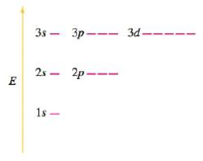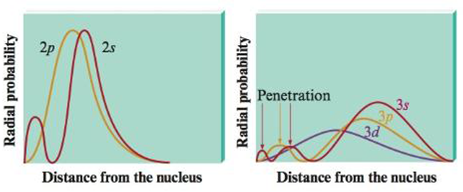
Chemistry
9th Edition
ISBN: 9781133611097
Author: Steven S. Zumdahl
Publisher: Cengage Learning
expand_more
expand_more
format_list_bulleted
Textbook Question
Chapter 7, Problem 78E
Tbe relative orbital levels for the hydrogen atom can be represented as

Draw the relative orbital energy levels for atoms with more than one electron and explain your answer. Also explain bow the following radial probability distributions support your answer.

Expert Solution & Answer
Trending nowThis is a popular solution!

Students have asked these similar questions
Seee the attached ima
Please see the attached image.
Please see the attached image.
Chapter 7 Solutions
Chemistry
Ch. 7 - Four types of electromagnetic radiation (EMR) are...Ch. 7 - Characterize the Bohr model of the atom. In the...Ch. 7 - What experimental evidence supports the quantum...Ch. 7 - List the most important ideas of the quantum...Ch. 7 - What are quantum numbers? What information do we...Ch. 7 - How do 2p orbitals differ from each other? How do...Ch. 7 - Four blocks of elements in a periodic table refer...Ch. 7 - What is the difference between core electrons and...Ch. 7 - Prob. 9RQCh. 7 - The radius trend and the ionization energy trend...
Ch. 7 - Prob. 1ALQCh. 7 - Defend and criticize Bohrs model. Why was it...Ch. 7 - The first four ionization energies for the...Ch. 7 - Compare the first ionization energy of helium to...Ch. 7 - Which has the larger second ionization energy,...Ch. 7 - Explain why a graph of ionization energy versus...Ch. 7 - Without referring to your text, predict the trend...Ch. 7 - Account for the fact that the line that separates...Ch. 7 - Explain electron from a quantum mechanical...Ch. 7 - Choose the best response for the following. The...Ch. 7 - Consider the following statement "The ionization...Ch. 7 - Prob. 12ALQCh. 7 - How does probability fit into the description of...Ch. 7 - What is meant by an orbital?Ch. 7 - Explain the difference between the probability...Ch. 7 - Is the following statement true or false? The...Ch. 7 - Which is higher in energy, the 2s or 2p orbital,...Ch. 7 - Prove mathematically that it is more energetically...Ch. 7 - What type of relationship (direct or inverse) e...Ch. 7 - What do we mean by the frequency of...Ch. 7 - Explain the photoelectric effectCh. 7 - Describe briefly why the study of electromagnetic...Ch. 7 - How does the wavelength of a fast-pitched baseball...Ch. 7 - The following is an energy-level diagram for...Ch. 7 - The Bohr model works for only one electron...Ch. 7 - We can represent both probability and radial...Ch. 7 - Consider the representations of the p and d atomic...Ch. 7 - The periodic table consists of four blocks of...Ch. 7 - Many times the claim is made that subshells...Ch. 7 - Prob. 30QCh. 7 - Elements with very large ionization energies also...Ch. 7 - The changes in electron affinity as one goes down...Ch. 7 - Why is it much harder to explain the line spectra...Ch. 7 - Scientists use emission spectra to confirm the...Ch. 7 - Does the minimization of electron-electron...Ch. 7 - In the hydtogen atom, what is the physical...Ch. 7 - The work function is the energy required to remove...Ch. 7 - Many more anhydrous lithium salts are hygroscopic...Ch. 7 - The laser in an audio CD player uses light with u...Ch. 7 - An FM radio station broadcasts at 99.5 MHz....Ch. 7 - Microwave radiation has a wavelength on the order...Ch. 7 - A photon of ultraviolet (UV) light possesses...Ch. 7 - Octyl methoxycinoamate and oxybenzone are common...Ch. 7 - Human color vision is " produced" by the nervous...Ch. 7 - Consider the following waves representing...Ch. 7 - One type of electromagnetic radiation has a...Ch. 7 - Carbon absorbs energy at a wavelength of 150. nm....Ch. 7 - X rays have wavelengths on the order of 1 1010 m....Ch. 7 - The work function of an element is the energy...Ch. 7 - It takes 208.4 kJ of energy to remove 1 mole of...Ch. 7 - It takes 7.21 1019 J of energy to remove an...Ch. 7 - Ionization energy is the energy required to remove...Ch. 7 - Calculate the de Broglie wavelength for each of...Ch. 7 - Neutron diffraction is used in determining the...Ch. 7 - A particle has a velocity that is 90.% of the...Ch. 7 - Calculate the velocities of electrons with de...Ch. 7 - Calculate the wavelength of light emiued when each...Ch. 7 - Calculate the wavelength of light emitted when...Ch. 7 - Using vertical lines, indicate the transitions...Ch. 7 - Using vertical lines, indicate the transitions...Ch. 7 - Calculate the longest and shortest wavelengths of...Ch. 7 - Assume that a hydrogen atoms electron has been...Ch. 7 - Does a photon of visible light ( 400 to 700 nm)...Ch. 7 - An electron is excited from the n = 1 ground state...Ch. 7 - Calculate the maximum wavelength of light capable...Ch. 7 - Consider an electron for a hydrogen atom in an...Ch. 7 - An excited hydrogen atom with an electron in the n...Ch. 7 - An excited hydrogen atom emits light with a...Ch. 7 - Using the Heisenberg uncertainty principle,...Ch. 7 - The Heisenberg uncertainty principle can be...Ch. 7 - What are the possible values for the quantum...Ch. 7 - Identify each of the following orbitals and...Ch. 7 - Which of the following sets of quantum numbers are...Ch. 7 - Which of the following sets of quantum numbers are...Ch. 7 - What is the physical significance of the value of...Ch. 7 - In defining the sizes of orbitals, why must we use...Ch. 7 - Total radial probability distributions for the...Ch. 7 - Tbe relative orbital levels for the hydrogen atom...Ch. 7 - How many orbitals in an atom can have the...Ch. 7 - How many electrons in an atom can have the...Ch. 7 - Give the maximum number of electrons in an atom...Ch. 7 - Give the maximum number of electrons in an atom...Ch. 7 - Draw atomic orbital diagrams representing the...Ch. 7 - For elements l36, there are two exceptions to the...Ch. 7 - The elements Si, Ga, As, Ge, Al, Cd, S, and Se are...Ch. 7 - The elements Cu, O, La, Y, Ba, Tl, and Bi are all...Ch. 7 - Write the expected electron configurations for...Ch. 7 - Write the expected electron configurations for...Ch. 7 - Write the expected ground-state electron...Ch. 7 - Using only the periodic table inside the front...Ch. 7 - Given the valence electron orbital level diagram...Ch. 7 - Identify the following elements. a. An excited...Ch. 7 - In the ground state of mercury, Hg, a. how many...Ch. 7 - In the ground state of element 115, Uup, a. how...Ch. 7 - Give a possible set of values of the four quantum...Ch. 7 - Give a possible set of values of the four quantum...Ch. 7 - Valence electrons are those electrons in the...Ch. 7 - How many valence electrons do each of the...Ch. 7 - A certain oxygen atom has the electron...Ch. 7 - Which of the following electron configurations...Ch. 7 - Which of elements 1-36 have two unpaired electrons...Ch. 7 - Which of elements 136 have one unpaired electron...Ch. 7 - One bit of evidence that the quantum mechanical...Ch. 7 - Identify how many unpaired electrons are present...Ch. 7 - Prob. 105ECh. 7 - Arrange the following groups of atoms in order of...Ch. 7 - Prob. 107ECh. 7 - Arrange the atoms in Exercise 108 in order of...Ch. 7 - In each of the following sets, which atom or ion...Ch. 7 - In each of the following sets, which atom or ion...Ch. 7 - Element 106 has been named seaborgium, Sg, in...Ch. 7 - The first ionization energies of As and Se are...Ch. 7 - Rank the elements Be, B, C, N, and O in order of...Ch. 7 - Consider the following ionization energies for...Ch. 7 - The following graph plots the first, second, and...Ch. 7 - For each of the following pairs of elements (C and...Ch. 7 - For each of the following pairs of elements (Mg...Ch. 7 - The electron affinities of the elements from...Ch. 7 - In the second row of the periodic table, Be, N,...Ch. 7 - Prob. 121ECh. 7 - Order the atoms in each of the following sets from...Ch. 7 - The electron affinity for sulfur is more negative...Ch. 7 - Which has the more negative electron affinity, the...Ch. 7 - Write equations corresponding to the following: a....Ch. 7 - Using data from the text, determine the following...Ch. 7 - Prob. 127ECh. 7 - Cesium was discovered in natural mineral waters in...Ch. 7 - 'The bright yellow light emitted by a sodium vapor...Ch. 7 - Does the information on alkali metals in Table 2-8...Ch. 7 - Predict the atomic number of the next alkali metal...Ch. 7 - Complete and balance the equations for the...Ch. 7 - Prob. 134ECh. 7 - "Lithium" is often prescribed as a...Ch. 7 - A carbon-oxygen double bond in a certain organic...Ch. 7 - Photogray lenses incorporate small amounts of...Ch. 7 - Mars is roughly 60 million km from the earth. How...Ch. 7 - Consider the following approximate visible light...Ch. 7 - One of the visible lines in the hydrogen emission...Ch. 7 - Using Fig. 2-30, list the elements (ignore the...Ch. 7 - Are the following statements true for the hydrogen...Ch. 7 - Although no currently known elements contain...Ch. 7 - Which of the following orbital designations are...Ch. 7 - The four most abundant elements by mass in the...Ch. 7 - Consider the eight most abundant elements in the...Ch. 7 - An ion having a 4+ charge and a mass of 49.9 u has...Ch. 7 - The successive ionization energies for an unknown...Ch. 7 - In the ground state of cadmium, Cd, a. how many...Ch. 7 - Prob. 152CWPCh. 7 - It takes 476 kJ to remove 1 mole of electrons from...Ch. 7 - Calculate, to four significant figures, the...Ch. 7 - Assume that a hydrogen atoms electron bas been...Ch. 7 - Determine the maximum number of electrons that can...Ch. 7 - Consider the ground state of arsenic, As. How many...Ch. 7 - Which of the following statements is(are) true? a....Ch. 7 - Identify the following three elements. a. The...Ch. 7 - For each of the following pairs of elements,...Ch. 7 - Which of the following statements is(are) true? a....Ch. 7 - Three elements have the electron configurations...Ch. 7 - The figure below represents part of the emission...Ch. 7 - One of the emission spectral lines for Be3+ has a...Ch. 7 - The figure below represents part of the emission...Ch. 7 - When lhe excited electron in a hydrogen atom falls...Ch. 7 - Prob. 167CPCh. 7 - For hydrogen atoms, the wave function for the...Ch. 7 - The wave function for the 2pz, orbital in the...Ch. 7 - Answer the following questions, assuming that ms,...Ch. 7 - Assume that we are in another universe with...Ch. 7 - Without looking at data in the text, sketch a...Ch. 7 - The following numbers are the ratios of second...Ch. 7 - We expect the atomic radius to increase going down...Ch. 7 - The ionization energy for a 1s electron in a...Ch. 7 - An atom of a particular element is traveling at...Ch. 7 - As the weapons officer aboard the Srarship...Ch. 7 - Answer the following questions based on the given...
Knowledge Booster
Learn more about
Need a deep-dive on the concept behind this application? Look no further. Learn more about this topic, chemistry and related others by exploring similar questions and additional content below.Similar questions
- V Biological Macromolecules Drawing the Haworth projection of an aldose from its Fischer projection Draw a Haworth projection of a common cyclic form of this monosaccharide: H C=O HO H HO H H OH CH₂OH Explanation Check Click and drag to start drawing a structure. Xarrow_forwardComplete the mechanismarrow_forwardComplete the mechanismarrow_forward
- 8 00 6 = 10 10 Decide whether each of the molecules in the table below is stable, in the exact form in which it is drawn, at pH = 11. If you decide at least one molecule is not stable, then redraw one of the unstable molecules in its stable form below the table. (If more than unstable, you can pick any of them to redraw.) Check OH stable HO stable Ounstable unstable O OH stable unstable OH 80 F6 F5 stable Ounstable X Save For Later Sub 2025 McGraw Hill LLC. All Rights Reserved. Terms of Use | Privacy C ཀྭ་ A F7 매 F8 F9 4 F10arrow_forwardJust try completing it and it should be straightforward according to the professor and TAs.arrow_forwardThe grading is not on correctness, so if you can just get to the correct answers without perfectionism that would be great. They care about the steps and reasoning and that you did something. I asked for an extension, but was denied the extension.arrow_forward
arrow_back_ios
SEE MORE QUESTIONS
arrow_forward_ios
Recommended textbooks for you
 Chemistry: Principles and PracticeChemistryISBN:9780534420123Author:Daniel L. Reger, Scott R. Goode, David W. Ball, Edward MercerPublisher:Cengage Learning
Chemistry: Principles and PracticeChemistryISBN:9780534420123Author:Daniel L. Reger, Scott R. Goode, David W. Ball, Edward MercerPublisher:Cengage Learning World of Chemistry, 3rd editionChemistryISBN:9781133109655Author:Steven S. Zumdahl, Susan L. Zumdahl, Donald J. DeCostePublisher:Brooks / Cole / Cengage LearningChemistry: Matter and ChangeChemistryISBN:9780078746376Author:Dinah Zike, Laurel Dingrando, Nicholas Hainen, Cheryl WistromPublisher:Glencoe/McGraw-Hill School Pub Co
World of Chemistry, 3rd editionChemistryISBN:9781133109655Author:Steven S. Zumdahl, Susan L. Zumdahl, Donald J. DeCostePublisher:Brooks / Cole / Cengage LearningChemistry: Matter and ChangeChemistryISBN:9780078746376Author:Dinah Zike, Laurel Dingrando, Nicholas Hainen, Cheryl WistromPublisher:Glencoe/McGraw-Hill School Pub Co Introductory Chemistry: An Active Learning Approa...ChemistryISBN:9781305079250Author:Mark S. Cracolice, Ed PetersPublisher:Cengage Learning
Introductory Chemistry: An Active Learning Approa...ChemistryISBN:9781305079250Author:Mark S. Cracolice, Ed PetersPublisher:Cengage Learning Physical ChemistryChemistryISBN:9781133958437Author:Ball, David W. (david Warren), BAER, TomasPublisher:Wadsworth Cengage Learning,
Physical ChemistryChemistryISBN:9781133958437Author:Ball, David W. (david Warren), BAER, TomasPublisher:Wadsworth Cengage Learning, Chemistry: The Molecular ScienceChemistryISBN:9781285199047Author:John W. Moore, Conrad L. StanitskiPublisher:Cengage Learning
Chemistry: The Molecular ScienceChemistryISBN:9781285199047Author:John W. Moore, Conrad L. StanitskiPublisher:Cengage Learning

Chemistry: Principles and Practice
Chemistry
ISBN:9780534420123
Author:Daniel L. Reger, Scott R. Goode, David W. Ball, Edward Mercer
Publisher:Cengage Learning

World of Chemistry, 3rd edition
Chemistry
ISBN:9781133109655
Author:Steven S. Zumdahl, Susan L. Zumdahl, Donald J. DeCoste
Publisher:Brooks / Cole / Cengage Learning

Chemistry: Matter and Change
Chemistry
ISBN:9780078746376
Author:Dinah Zike, Laurel Dingrando, Nicholas Hainen, Cheryl Wistrom
Publisher:Glencoe/McGraw-Hill School Pub Co

Introductory Chemistry: An Active Learning Approa...
Chemistry
ISBN:9781305079250
Author:Mark S. Cracolice, Ed Peters
Publisher:Cengage Learning

Physical Chemistry
Chemistry
ISBN:9781133958437
Author:Ball, David W. (david Warren), BAER, Tomas
Publisher:Wadsworth Cengage Learning,

Chemistry: The Molecular Science
Chemistry
ISBN:9781285199047
Author:John W. Moore, Conrad L. Stanitski
Publisher:Cengage Learning
Quantum Numbers, Atomic Orbitals, and Electron Configurations; Author: Professor Dave Explains;https://www.youtube.com/watch?v=Aoi4j8es4gQ;License: Standard YouTube License, CC-BY
QUANTUM MECHANICAL MODEL/Atomic Structure-21E; Author: H to O Chemistry;https://www.youtube.com/watch?v=mYHNUy5hPQE;License: Standard YouTube License, CC-BY